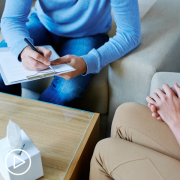MPN Patient Shares Importance of Understanding Benefits of Professional Therapy
MPN Patient Shares Importance of Understanding Benefits of Professional Therapy from Patient Empowerment Network on Vimeo.
Myelofibrosis patient Julia Olff shares her experience with seeing a professional therapist via telemedicine as part of her MPN care.
See More From the MPN TelemEDucation Resource Center
Related Resource:

|

|
Transcript:
Julia Olff:
When I was diagnosed with myelofibrosis, I learned how important it was to continue therapy, so I had already started to see a therapist several years before that for a set of long-term issues in my life. But what I found over time, and I continue to find is the therapy has really helped me cope with not just some of the parts of my personal life that I’m still working through, but really helps me having a chronic illness, and I know from attending patient conferences, reading about myelofibrosis that there is…for one, a significant population of folks who suffer from anxiety with myelofibrosis. And that’s true for other blood cancers and chronic cancers, where there’s this, that there are ups and downs where you’re going through a period of stressful treatments, possibly followed by periods of monitoring or less treatment, and there’s always that fear of or worry about what may happen next, when might I develop a more serious mutation that will affect my prognosis, could I progress any time? Or there’s a smaller percentage of folks with myelofibrosis who can develop acute myelogenous leukemia, that’s always there. And I think therapy really helps for those sorts of outlook, long-term mindfulness, living in the present and gaining perspective about some of those fears. And I think the other part of therapy that’s so beneficial as it relates to having myelofibrosis is kind of learning to cope on a day-to-day basis, learning to think about yourself and your self-esteem that can get lost when you are feeling unwell for long periods of time. I’ve had months where I was deeply fatigued in terrible pain and doing a lot less and having to say no to my kids, I can’t do that, I can’t go here.
I remember going to back-to-school nights for my kids when they’re in high school, and I’m moving so slowly that I’m getting a teacher asking me, “Are you okay, do you need help?” And that can affect your sense of self, especially as you give up activities or work. I’ve reduced my workload significantly, and all to say is there is this dynamic of who you are as a person, that therapy I’ve found can help me get through so that I don’t lose who I am that helps really sustain my mental outlook.











